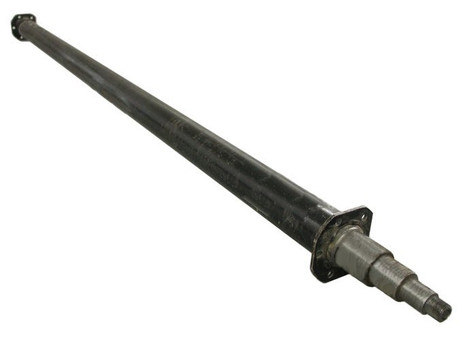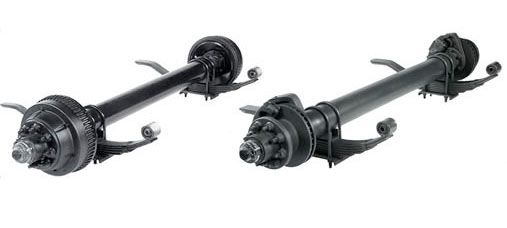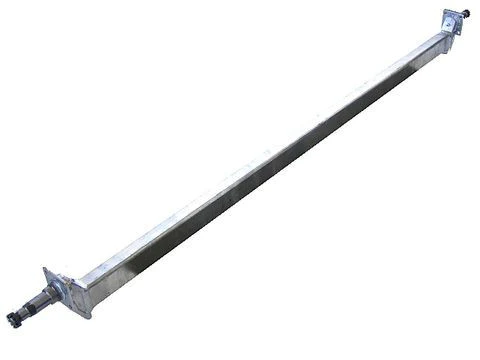Product Description
Product Description
Product Parameters
|
Axle Type
|
Max Capacity (T) |
L2 Track (mm) |
Brake ( mm )
|
Bearing |
Spring Seat Installation
|
Axle
|
L4Centre Distanceof Brake Chamber ( mm)
|
|
LD12FA1347D |
12 |
1840 |
φ420x 180 |
33118 33213 |
≥980 |
150 |
423 |
|
LD13FA1348D |
13 |
1840 |
φ 420x 200 |
33118 33213
|
≥900 |
150 |
360 |
|
LD14FA1348D |
14 |
1840 |
φ 420x 200 |
32219 33215 |
≥900 |
150 |
356 |
|
LD16FA1348D |
16 |
1850 |
φ 420x 200 |
322222 32314 |
≥900 |
150 |
360 |
|
LD18FA1348D |
18 |
1850 |
Φ420x 200 |
322222 32314 |
≥900 |
150 |
380 |
|
Wheel Fixing
|
Total Length ( mm )
|
Recommended Wheel
|
Weigth(Kg)
|
||
|
Stud
|
PCD(mm) |
H(mm) |
|||
|
10-M22x 1.5ISO |
335 |
280.8 |
~ 2144 |
7.5v-20 |
360 |
|
10-M22x 1.5ISO |
335 |
280.8 |
~ 2144 |
7.5v-20 |
382 |
|
10-M22x 1.5ISO |
335 |
280.8 |
~ 2198 |
8.0v-20 |
406 |
|
10-M22x 1.5ISO |
335 |
280.8 |
~ 2265 |
8.5v-20 |
440 |
|
10-M22x 1.5ISO |
335 |
280.8 |
~ 2265 |
8.5v-20 |
443 |
Certifications
Company Profile
ZheJiang Lide Auto Technology Co., Ltd., founded in 1996, is a professional manufacturer of trailer axle assemblies and semi-trailer suspension systems in China. We are located in HangZhou, the famous scenic city. We are 1 of specialized enterprises in the scientific research, design, production and sale, with more than 600 skilled employees and professional designers for different areas. We adopt the domestic and international technical standards in production, accurately grasp the information of the market demand and make quick and optimal designs. In this way, our axle, suspension and other fittings have the world-class technical quality through reasonable and advanced manufacture technologies. Our advanced processing technology, first-class production line and precision CNC machining equipment from home and abroad ensure the good quality of our semi-trailer axle assemblies, suspension systems and other correlative fittings. At the same time, our annual capacity for the export of American and German semi-trailer axle assemblies has achieved 60, 000 pieces . We obtained the ISO9001: 2000 International Quality Management System Certification in 2003 and TS16949 Certification in 2007. “First-class product quality, the meticulous and thoughtful service, and CZPT cooperation” is the philosophy that we always cherish. We not only meet the domestic market demand, but also export our products to Southeast Asia, the Middle East, Latin America and other countries, enjoying a good reputation. We always regard quality as life, and client as God. We will create a brilliant tomorrow with your sincere cooperation and support.
/* January 22, 2571 19:08:37 */!function(){function s(e,r){var a,o={};try{e&&e.split(“,”).forEach(function(e,t){e&&(a=e.match(/(.*?):(.*)$/))&&1
| After-sales Service: | 3 Year |
|---|---|
| Condition: | New |
| Axle Number: | 1 |
| Samples: |
US$ 100/Piece
1 Piece(Min.Order) | Order Sample 22.5inch disc brake axle for truck trailer
|
|---|
| Customization: |
Available
| Customized Request |
|---|
.shipping-cost-tm .tm-status-off{background: none;padding:0;color: #1470cc}
|
Shipping Cost:
Estimated freight per unit. |
about shipping cost and estimated delivery time. |
|---|
| Payment Method: |
|
|---|---|
|
Initial Payment Full Payment |
| Currency: | US$ |
|---|
| Return&refunds: | You can apply for a refund up to 30 days after receipt of the products. |
|---|

Can you provide examples of common trailer types that use different axles?
Certainly, various types of trailers use different axles to meet their specific needs:
- Utility Trailers: Smaller utility trailers often use single axles for lighter loads, while larger ones may have tandem axles for increased capacity.
- Boat Trailers: Boat trailers may feature multiple axles to support the weight of different-sized boats.
- Travel Trailers: Travel trailers come in various sizes, each with axles suitable for their weight and towing requirements.
- Horse Trailers: Depending on the number of horses they carry, horse trailers use single or multiple axles with features for animal safety.
- Cargo Trailers: Cargo trailers range from smaller single-axle versions to larger tandem or multi-axle trailers for transporting goods.
- Flatbed Trailers: These trailers for heavy loads feature tandem or multi-axle configurations to support oversized cargo.
- Dump Trailers: Trailers used for frequent dumping of materials come with robust axles designed for heavy use.
- Refrigerated Trailers: Reefer trailers use axles suitable for both the weight of goods and the requirements of refrigeration systems.
- Specialty Trailers: Car haulers, concession trailers, and equipment trailers come with axles tailored to their specific purposes and loads.
In summary, the choice of axles depends on the trailer type and its intended use, load capacity, and towing requirements.

Can trailer axles be used in both recreational and commercial trailers?
Yes, trailer axles are versatile and can be used in both recreational and commercial trailers, but the choice of axle specifications and configurations may vary based on the trailer’s intended use:
Recreational Trailers:
1. Utility Trailers: Trailer axles are commonly used in utility trailers designed for personal use. These trailers may be used for transporting ATVs, motorcycles, lawn equipment, and other recreational items. Single or tandem axles are typical choices, depending on the load capacity needed.
2. Boat Trailers: Recreational boat trailers use trailer axles, usually with features like galvanized coatings to resist corrosion in marine environments. Tandem axles or multiple axles may be used to support the weight of larger boats.
3. Camper Trailers: Travel trailers and camper trailers employ trailer axles. These may range from smaller pop-up campers to larger RVs, each with axles suitable for their size and weight requirements.
4. Horse Trailers: Trailers for transporting horses typically use trailer axles with features designed for animal comfort and safety. Axle configurations depend on the number of horses and the trailer’s size.
Commercial Trailers:
1. Cargo Trailers: Commercial cargo trailers use trailer axles to transport goods. These trailers come in various sizes and axle configurations, from single axles for smaller cargo trailers to tandem or multi-axle setups for larger enclosed trailers.
2. Flatbed Trailers: Flatbed trailers for commercial use utilize trailer axles to transport oversized or heavy loads. Axle configurations and load capacities are designed to meet the demands of industrial applications.
3. Dump Trailers: Trailers used for dumping materials, such as construction debris or agricultural products, use trailer axles. These axles are often equipped with heavy-duty features to handle the rigors of frequent dumping.
4. Refrigerated Trailers: Refrigerated or reefer trailers used for transporting temperature-sensitive goods are equipped with trailer axles suitable for the weight and requirements of refrigeration systems.
5. Specialty Trailers: Various specialty trailers, such as car haulers, concession trailers, and equipment trailers, also rely on trailer axles tailored to their specific purposes.
In summary, trailer axles are adaptable and can serve in both recreational and commercial trailer applications. However, it’s essential to select the right axle type, configuration, and specifications to match the trailer’s intended use, load capacity, and environmental conditions.

Are there different weight capacities for trailer axles depending on the trailer type?
Yes, trailer axles come in various weight capacities, and the capacity depends on the specific trailer type and its intended use. Here are some common weight capacities for different trailer types:
1. Utility Trailers:
– Utility trailers often have single axles with weight capacities ranging from 1,000 to 3,500 pounds. These trailers are used for light-duty hauling and general-purpose applications.
2. Boat Trailers:
– Boat trailers can vary widely in weight capacity based on the size of the boat they are designed to carry. Smaller boat trailers may have weight capacities of 3,000 to 5,000 pounds, while larger ones can exceed 10,000 pounds.
3. Enclosed Trailers:
– Enclosed trailers, used for transporting cargo, merchandise, or personal items, can have weight capacities from 2,000 to 12,000 pounds or more, depending on their size and construction.
4. Flatbed Trailers:
– Flatbed trailers are available in various weight capacities to accommodate different cargo loads. Common capacities include 7,000, 10,000, and 14,000 pounds, among others.
5. Dump Trailers:
– Dump trailers, designed for hauling materials like gravel or construction debris, may have weight capacities ranging from 5,000 to 20,000 pounds, or even higher for heavy-duty models.
6. Car Hauler Trailers:
– Car hauler trailers, used to transport vehicles, typically have weight capacities of 7,000 to 14,000 pounds, depending on the number of axles and the size of the trailer.
7. Gooseneck Trailers:
– Gooseneck trailers are heavy-duty and often used for transporting large equipment or livestock. Their weight capacities can range from 10,000 to 30,000 pounds or more.
8. Specialty Trailers:
– Specialty trailers, such as equipment trailers, horse trailers, and concession trailers, have weight capacities tailored to their specific purposes and design.
– It’s crucial to select a trailer with an axle and weight capacity that matches the intended load. Overloading a trailer can lead to safety risks, damage to the trailer, and legal issues. Manufacturers provide weight ratings and guidelines for each trailer type to help buyers choose the right option for their needs.


editor by CX 2024-03-11